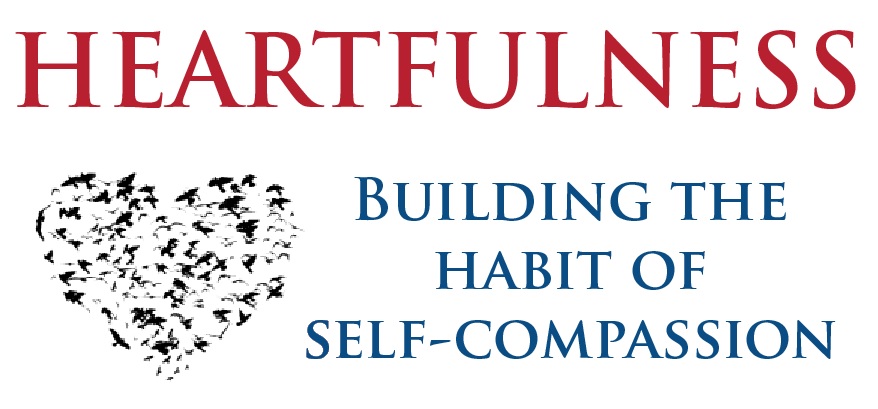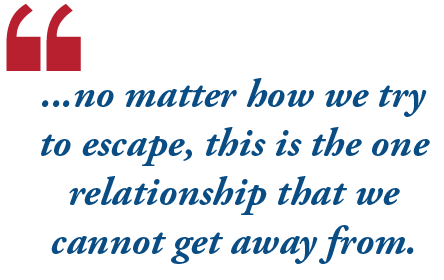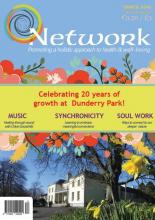Heartfulness - Building the habit of self-compassion
by:
Paul D'Alton
Published:
Monday, May 25, 2015

Mindfulness as an intervention began with John Kabat Zinn in the University of Massachusetts in the late 70s. He was working in a hospital and there were many people there who doctors and professionals felt like they couldn’t do much with, these people were suffering with chronic pain. Kabat-Zinn thought that teaching meditation might help and set up a program, and that is where the version that most of us know today came from.
Mindfulness as a practice came from the Buddhist tradition, and it is a tiny piece of a much larger Buddhist package. Many of us spend our time thinking about the past or the future. You might a tendency for your mind to wander to the past and remember things that went wrong or didn’t happen. Or the mind can have a tendency to go to the future, and look at all the feared outcomes. The result is that we are very rarely in the present moment. Mindfulness is a way to build the muscle of attention in our brains.
There is often the idea that if we train in mindfulness we end up in this zombie-like state where the future or the past don’t matter. It is really important to say that the capacity we have to think about the future and the past is very crucial – that is how we learn and remember. But mindfulness training is really be about learning to be where we are but really appreciating the quality and nature of our lives, we need to reflect on decisions we have made in the past and think about decisions we will make in the future. So it is by no means an attempt to dumb any of that down at all.
Up until the 1960s the idea of a psychological intervention for people who were suffering really didn’t exist. In the 50s, through studies and observations in very large psychiatric facilities they realised that behaviour was affected when something was withdrawn or changed. Like a patient might behave predictably but if you did not give them a cigarette at the usual time then a new behaviour would come out of that. Out of that came behavioural therapy.
From that came cognitive behavioural therapy. CBT is interesting because it caused us to realise that the way we think about things really matters. How I interpret someone’s interaction with me really matters. If I am walking down the corridor at work and someone doesn’t say hello to me I will pretty quickly make an interpretation, sometimes unconsciously – and that might be that I have done something to upset them, or it could be that the person must have forgotten their glasses because they didn’t see me. But whatever the interpretation is, it will have an impact on my mood. The 70s and 80s saw a lot of focus on the role of cognition and how that impacts us.
And then this whole world of mindfulness opened up. These mindfulness based interventions take a very different position when it comes to how to view our thinking. Mindfulness doesn’t aim to get into dialogue with our thinking. We don’t have to answer our negative automatic thoughts. There has been a huge emphasis in popular psychology that advocates this idea of positive thinking. I work in oncology and it is particular alive in cancer care – this idea that you must be positive, and if you are not positive then your disease will get worse. And that is absolutely not true; there is no evidence to support that. But what we do see is what has been referred to as ‘the tyranny of the positive’ – this sense that our thoughts must be optimistic and future oriented, that we must talk back and correct the negative thoughts. Mindfulness asks us to take a very different position with our thoughts, rather than getting into an argument it is asking us to step back and watch the behaviour. So I develop a capacity to watch my thinking rather than jump into the ring with it.
Mindfulness is a very radical activity, and it is something we don’t do very quickly because we have a lifetime of thinking to recondition. Learning to pay attention and be where we are is the core of the practice. It is hard work and anyone who has ever meditated for just a couple of minutes will know how hard it is, because we sit to meditate and literally within seconds we are gone. Our minds will only stop wandering when we stop breathing. We are not trying to get to a place where the mind is not wandering – the really important ingredient in all of this is the non-judgemental attitude. When we learn to watch our thinking no-judgmentally then we move from the head to the heart.

In this part of the world we tend to be very dualistic in our thinking, and we see that what happens in our head and what happens in our heart as two separate processes. One of the downsides of what has happened in mindfulness over the years is that it has placed the emphasis on thinking, and it was John Kabat-Zinn who said at one point that maybe we got the name wrong, and we should have called it heartfulness. There was an unforeseen negative in calling in mindfulness. When we are not occupying our heart we can get into a very harsh relationship with our thoughts and ourselves. We can adopt almost a scientific sense of observation of our thoughts, and it can become very judgemental when we don’t involve the tenderness that we find in our hearts. The language that is used in the world of mindfulness training has changed, we used to say ‘paying attention’ to your breath, and now we talk about ‘being with’ your breath. We can end up creating quite a harsh relationship with ourselves with the fundamental belief that we are doing something good. Most of us suffer from that terrible epidemic of self-criticism, the belief that I cannot do this right and everyone else in the room can.
Years ago when I was seeing people for therapy as a psychologist, I used to watch patients that I worked with and watch where things change, and then I watched it more when I started teaching mindfulness, and the best way I could describe that moment of change at the time was that the person just softened to themselves. That wasn’t very acceptable language as a clinical psychologist, and there was certainly no evidence to support a softening of a relationship with oneself, so you had to be very careful about who you said that to. But that was my observation over those years, and in teaching mindfulness what I saw happen was that they became kinder to themselves. It sounds very simple, but I think that most of us know that it is probably the most profound thing that can happen to us as human beings, because I think that most of us know that the greatest pain that we feel is often the pain that we inflict upon ourselves through criticism and coldness, through the story that says I am not good enough, the story that says maybe they will find out one day, the story that says maybe I was responsible for what happened to me when I was a child. What I observed happening was that capacity for people to develop a kindness to themselves.
I think if most of us were to describe the self to self relationship we would have to say it is competitive, cold, critical, with a sense of not-quite- good-enough. I think it is a very serious issue that we face in this part of the world. The harshness of that relationship causes a tremendous amount of psychological suffering. I can see this through years of delivery mindfulness courses to people, and I can see it through years of working with people in therapy. But I can most clearly see it in the relationship I have had with myself. There were many years when the relationship I had with myself was really unpleasant, it was probably in some ways quite hostile and abusive. And that relationship is probably a relationship that was mediated and informed by the society I grew up in, about how I saw understood myself. And that resulted in all sorts of behaviours that were not helpful either. I think the most significant and the most enduring changes that have come about for me have emerged from a softening of my relationship with myself. A growing kindness and a growing tolerance for me in all of how I present.
After around 20 years of mindfulness interventions being delivered, and studies showing that it provided relief for people suffering from depression and anxiety, researchers in the UK put their heads together to try to pinpoint exactly what brings about the change. What they identified as a key factor is this kind of softening to oneself. So they identified and introduced into the literature the concept of self-compassion. Suddenly there was a language to help us understand the process, and to help facilitate more research. If you look at the current research there is an enormous amount in the past few years on self-compassion and self to self-relating. In a way it is the new frontier in the world of psychology, understanding how we can look at the way we relate to ourselves and the impact that can have in terms of how happy and content we feel, and how aware we feel, and how socially connected we feel.
Compassion means to suffer alongside. It doesn’t mean to take away suffering, and it doesn’t mean to be extra nice. It doesn’t mean to indulge. By being compassionate we turn up to our suffering. And when we are compassionate to someone else we turn up to their suffering, we don’t pretend it is not there. So self-compassion is learning to suffer with myself, to be present to all of myself, the good, the bad, and the ugly. Our relationship with ourselves is very much conditioned, it is strongly influenced by our family and how we grow up, and further influenced by the wider social environment we find ourselves in. Much of the challenge of developing self-compassion lies in whether I can recognise that this condition of how I relate to myself is both an aspect that I carry as an individual, and also one that is common to all of humanity.

There is a lovely practice that we do in our training that was developed by Pema Chodron, and it is a practice called Just Like Me. And when you find yourself in a situation, like you might be stuck in traffic, and if you can slow down and observe the people around you. And begin that simple practice, saying just like me, they want to be happy and loved, and they want to be respected, they want to get to work. Our tendency is that when we suffer, we can get very blinkered and believe that it is just me that is feeling the suffering, but what is happening is part of our common experience.
Sometimes doing these practices can serve as an interruption, it moves us out of the hurricane of selfing. When we think about that in terms of metacognition, we realise that we can end up living a lot of our lives in threat mode when our body is on high-alert and a lot of that is amplified by a narrow sense of myself as an individual and not part of a collective whole. The endless pursuit of self is very active in a lot of capitalist culture and ideology. There is a dichotomy of ‘the self’ versus ‘the collective’.
It might take several decades to come into whatever relationship I currently have with myself to develop, and so it makes sense that it might take an equal amount of time for that to change. The relationship we have with ourselves developed in the earliest years of our lives, when our brains were at their most formative. I am not saying this to sound unhopeful at all, I think the opposite. I think change is incremental. If we set our minds on being mindful without developing self-compassion then we are bound to get nowhere. They go hand in hand and I think it is the work of a lifetime.
A lot of us spend our lives beating ourselves up, and then at some point we might realise that no matter how we try to escape, this is the one relationship that we cannot get away from. Unfortunately so many people are driven to complete suicide in an attempt to escape this relationship because it can be so terrifying. The idea that we can view ourselves with that enormous kindness that just says – you poor thing, how could you be any other way – that is when it begins to shift. Once we gain that shift in perspective we have it forever, there is no way back. Sometimes we fall very quickly back into old patterns, but I think the relationship with ourselves is fundamentally altered once we have that compassionate experience of ourselves.
We grew up with an idea in this little country that said that you have to careful about what you do, you have to be hard on yourself because if you are too kind you let yourself go and get yourself into trouble, and basically as a human being you are not good. The bottom line of what a lot of us were fed was a kind of basic badness that exists in us. Some people ask how to we erase that. The answer is that we cannot. When we try to erase or get rid of our conditioning it just gets louder and louder. The paradox is that we need to make friends with it. There is a saying that what you resist persists. By befriending those influences, and compassionately noticing the influence they have had on our lives, they begin to settle a little and they are less convincing because we are not getting into an argument with them.
Sometimes we hear that we need to accept these parts of ourselves. This comes up an awful lot for the people I work with, who have very serious illnesses. The way I see it, acceptance is probably for the next lifetime, what we can work on at the moment is allowing. They are very similar words but they are radically different. I think it is probably more compassionate to set our attention to allowing rather than accepting. I often say to parents that it is a bit like your relationship to an adolescent at home who is doing something that you know is not good, it is not good for them and it is not good for you, and you know that. What I am suggesting is that you do not need to accept their behaviour, but the invitation is to allow it and give it some space. You don’t like it, you don’t want it, you know it is not good, and you didn’t choose it. To accept that is a big ask, but can we allow it to just be there? It is a softer way to be with the difficulties that life brings with it. I think it is a less judgmental and a little more spacious approach. There are lots of things in our lives that we will never accept and that is OK. I don’t believe that we get to a point in our lives when we fully accept a lot of the difficult things that will occur to us. I think allowing is a much more fluid and a kinder way to be with ourselves.
About the author:
 Dr. Paul D’Alton is head and clinical lead of the Department of Psycho-oncology at St. Vincent’s University Hospital. Dr D’Alton’s primary area of clinical interest is the application of mindfulness-based interventions in health care. He completed his internship and teacher intensive training at the University of Massachusetts (USA) where mindfulness-based interventions in health care originated. He teaches at undergraduate and post-graduate level in University College Dublin, Trinity College Dublin and with the Royal College of Surgeons in Ireland.
Dr. Paul D’Alton is head and clinical lead of the Department of Psycho-oncology at St. Vincent’s University Hospital. Dr D’Alton’s primary area of clinical interest is the application of mindfulness-based interventions in health care. He completed his internship and teacher intensive training at the University of Massachusetts (USA) where mindfulness-based interventions in health care originated. He teaches at undergraduate and post-graduate level in University College Dublin, Trinity College Dublin and with the Royal College of Surgeons in Ireland.
In Issue:
Latest Issue
Upcoming Events
-
17/04/2020 to 26/04/2020
-
18/04/2020
-
23/04/2020
-
15/05/2020 to 23/05/2020
-
16/05/2020 to 17/05/2020
Recent Articles
Article Archive
- November 2014 (1)
- January 2015 (2)
- February 2015 (2)
- April 2015 (3)
- May 2015 (4)
- June 2015 (9)
- August 2015 (5)
- October 2015 (2)
- November 2015 (1)
- January 2016 (8)

